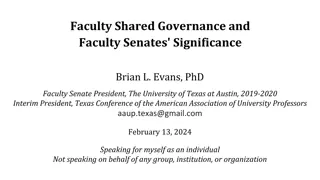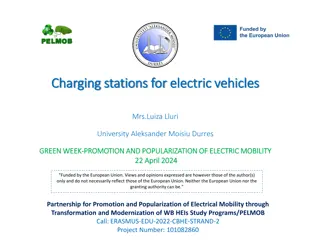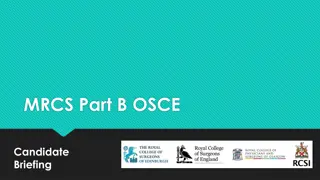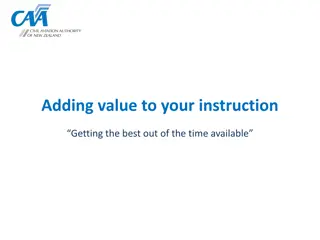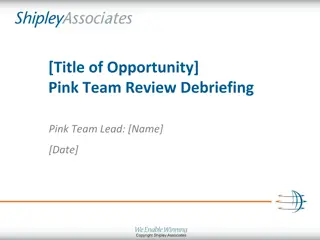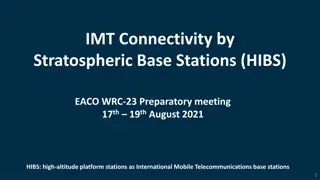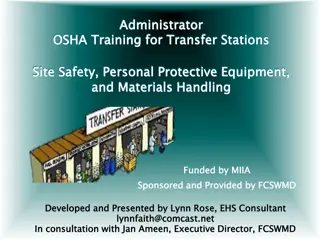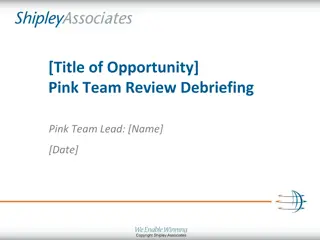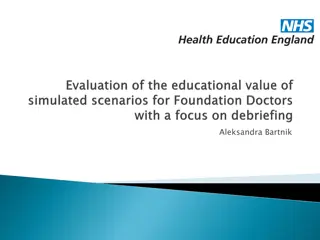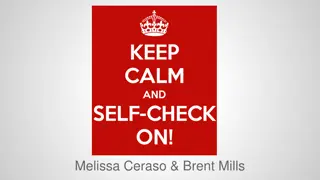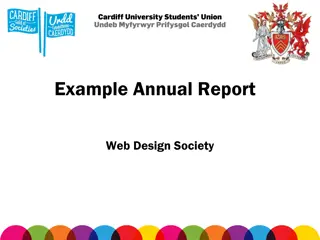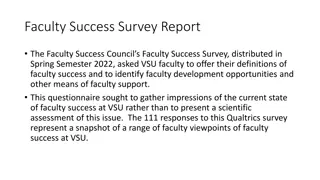
Effective Debriefing Techniques for Educational Workshops
Learn about effective debriefing techniques for educational workshops, including key components like safety, confidentiality, and constructive feedback. Explore the importance of facilitating debrief sessions with good judgment and promoting reflective understanding. Enhance your communication skills in post-scenario discussions and utilize a structured model for debriefing to ensure consistency and engagement.
Download Presentation

Please find below an Image/Link to download the presentation.
The content on the website is provided AS IS for your information and personal use only. It may not be sold, licensed, or shared on other websites without obtaining consent from the author. If you encounter any issues during the download, it is possible that the publisher has removed the file from their server.
You are allowed to download the files provided on this website for personal or commercial use, subject to the condition that they are used lawfully. All files are the property of their respective owners.
The content on the website is provided AS IS for your information and personal use only. It may not be sold, licensed, or shared on other websites without obtaining consent from the author.
E N D
Presentation Transcript
Debriefing Communications Stations Dr Ben Ivory National Education CLOD
Communication Workshop Debrief Information for Faculty Outline a model for debriefs Workshops are 45 mins long. 20-25 minutes for the scenario, 20-25 minutes for the debrief Consistency in debrief model & messages important Using the observing participants, actors and the lead participant for the debrief If the scenario starts to go off track- stop it. Invite feedback and try to allow time to replay. The actors will be prepared for this. Official observers will not be invited to feedback in during the debrief session The Deceased Donation Course (ICM)
Our Model of Debrief Safety Confidence Confidentiality Constructive Debrief is the difference between facilitation & teaching Debriefing with good judgement The actor s power to give accurate feedback Course uses simple mnemonic to help remember what to talk about A Accuracy B Brevity C Clarity (Compassion) D Delivery The Deceased Donation Course (ICM)
The Vent Immediately post scenario How did that feel? Allows a release of emotion and may identify topics for discussion Try to steer away from specifics Acknowledge & park issues for later That s important but before we discuss that . There will be different opinions on that, but first can we discuss how we got to that point The Deceased Donation Course (ICM)
The Summary Ask for a 2 line summary of the scenario E.g. Object of the discussion was to explain brain stem tests, or to establish futility in further treatment and explore opinions on end of life care etc Failure here would point to poor simulation set up OR poor planning The Deceased Donation Course (ICM)
Debriefing with good judgement Technique described by Jenny Rudolph and Dan Raemer in Harvard Attempt to move away from non-judgemental debriefing Developed in simulation but applicable for all debriefing Deals with negativity rationally, challenges and allows reflective understanding The Deceased Donation Course (ICM)
Neither of these works. Judgemental Who can tell me what went wrong there? What was Ben s big mistake? Addresses actions Truth is held by the instructor Leaves little doubt as to the opinion of the instructor Non Judgemental Fails to address failings Shit sandwich approach Important messages may be masked in an attempt to psychologically protect participants Usually people know if there was a problem and will lose respect for the instructor who does not address it The Deceased Donation Course (ICM)
Good judgement Aims to provide an unambiguous discussion of mistakes / options Aims to explore reasons behind actions and their consequences ( frames ) Does not assume that the instructor knows the reasons behind a particular action The Deceased Donation Course (ICM)
Rigorous reflection The Deceased Donation Course (ICM)
Key words to use To participant I was concerned . It worried me that . You seemed uncomfortable when why was that? I thought it was really powerful when you said..... What were you worried about ? To actors / others To the actors What was your reaction when how might that have changed if ? What did you understand at that point ? Was there another option here? The Deceased Donation Course (ICM)
Practicalities of debriefing 2 lists one for technical points, one for none- technical / communication Very time limited pick the 3 or 4 you think are most important OR that the participants identify May need to steer the conversation in the direction you want ? Role for chronological discussion The Deceased Donation Course (ICM)
Challenges Encourage participants to see toughest questions / issues as biggest opportunity to gain trust and understanding The Deceased Donation Course (ICM)
Common themes Talking over silences reinforce that if it doesn t feel uncomfortable to you, it probably isn t long enough Too rapid a progression to death/donation talk about telegraphing bad news, paraphrasing etc Not explicitly expressing empathy saying I m so sorry The Deceased Donation Course (ICM)
End Ask each participant to give you a take home message that they have gained from the simulation experience If necessary re-iterate the learning objectives and key points Watch for the participant who may need further support The Deceased Donation Course (ICM)


![Read⚡ebook✔[PDF] Linking the Space Shuttle and Space Stations: Early Docking Te](/thumb/21519/read-ebook-pdf-linking-the-space-shuttle-and-space-stations-early-docking-te.jpg)
